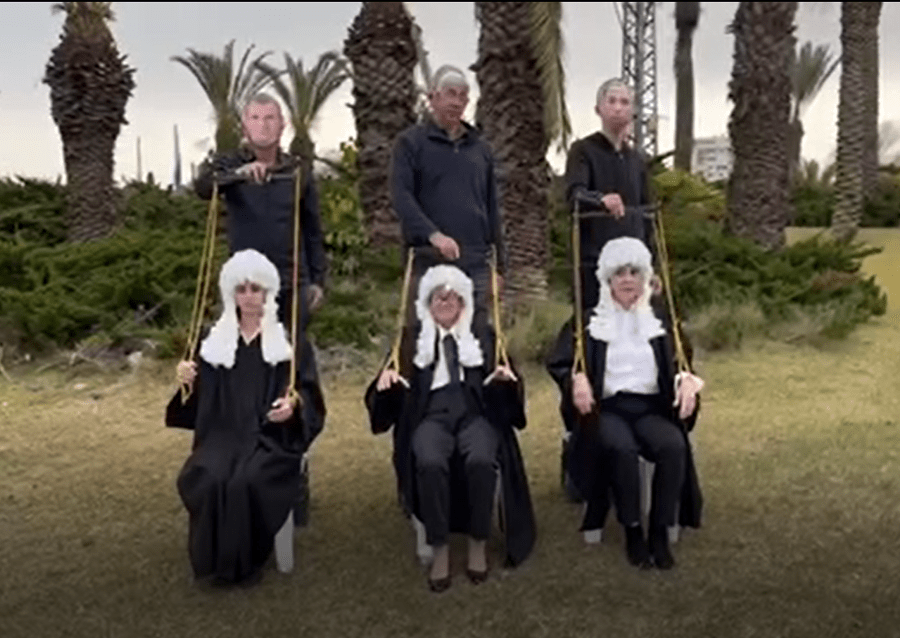Israel’s protests show a turning point in the country’s history

“It’s a historic time for Israel. For many years we called ourselves a democracy, but it’s only just a democracy.” Dr. Orna Raz, a peace activist who advocates for the participation of women in peacemaking and security, is speaking about the Israeli government’s controversial plan to change the country’s judicial system. The reforms would weaken the Supreme Court and give the Knesset, Israel’s parliament, more control over appointing justices.
Raz has been taking part in nationwide demonstrations since they began three months ago, when people took to the streets to protest the government and the proposed reforms. “In our declaration of independence, we stated that Israel is a Jewish and democratic state. And to balance between the two has always been a challenge, but it’s essential. Now we are facing this attempt to turn the country into a Jewish state in a biblical sense – not according to any laws, but because the government is very corrupt.”
“They are trying to change the laws so that the Knesset can overturn basic legislation, like human dignity and freedom of employment, or laws that give equality to minorities and women,” Raz tells us. “These religious fanatics are going to ruin everybody.”
Netanyahu’s right wing government
In December 2022, Benjamin Netanyahu became prime minister for a record sixth term, just 18 months after losing power. His return happened thanks to his Likud party forming a coalition with ultranationalist and ultra-Orthodox Jewish allies – the most religious and right-wing government in Israel’s history.
The new administration is largely male, with women holding only six of the 32 ministries. Two of the parties in the ruling coalition, the ultra-Orthodox United Torah Judaism and Shas, refuse to have women on their slates of candidates for parliament, let alone to be represented by a female cabinet minister.
Itamar Ben-Gvir, one of the most controversial ministers
Far-right national security minister Itamar Ben-Gvir, who was convicted of inciting racism and supporting a terrorist organisation in 2008, was recently barred by the High Court of Justice from giving orders for ongoing police operations. The Attorney-General expressed concerns about Ben-Gvir’s interference in law enforcement when the minister tried to amend the law that regulates police operations so its ministry would have more direct control of its forces and policies.
“He virtually tried to take over the police, and to tell them how they should handle the demonstrations, hoping that they would become violent,” says Robi Damelin, spokesperson and director of International Relations at the The Parents Circle-Families Forum (PCFF). “He has affected our work in the past with demonstrations outside schools.”
The PCFF is a joint Israeli-Palestinian organisation of over 600 families who have lost an immediate family member to the ongoing conflict. Its activities include “dialogue meetings” for young people and adults, to help them engage in reconciliation instead of conflict.
“We work a lot with 17-year-old kids who are about to go to the army and have probably never met a Palestinian in their lives. So we do a dialogue meeting in their school with a Palestinian and an Israeli working together,” Damelin explains. “Itamar Ben-Gvir created all these demonstrations outside schools, not having the faintest idea what we are doing in the classroom, never hearing our message – just deciding that Palestinians are terrorists and we are betraying Israelis. That we don’t respect children who die. It can be difficult for us because this government is not in favour of our work.”
“Ben-Gvir also stopped a law from passing that makes men who threaten their wives wear an electronic monitoring bracelet, which is terribly important as we have a very high murder rate of women,” Damelin adds. Instead the minister has promised to advance his own version of the legislation, which he claims will go further to balance men’s rights against the needs of women in potential danger.
“The situation is as dark as it’s ever been,” Damelin says. “I find it hard to believe that we have what is no less than a fascist government, with some very right wing, frightening people. But the one extraordinary thing is all the demonstrations. Thousands and thousands of people are out on the streets, all the time. That gives you a sense of hope.”
Unprecedented demonstrations
Widespread mass protests have shut down much of Israel, with people from all walks of life taking part. “The government has made people renew their commitment to Israel,” says Raz. “The first demonstration had about 10,000 people. Now we’re more than half a million. For years, young people did not come to demonstrations – it was mainly people from my generation demonstrating on Balfour street, where Netanyahu lives. But now it’s families, people of all ages, of all religions, who are against the craziness that is going on.”
Unmissable in the crowds are the women protesting as characters from Margaret Atwood’s dystopian novel ‘The Handmaid’s Tale’, dressed in red cloaks and white caps, walking with their heads bowed and clasped hands. “They started with 20 women and now, you can see them all over the world, like at the protests in Berlin. It’s amazing. It’s gimmicky, but it’s effective,” Raz tells us.
Among protesters are also Israel Defense Forces reservists: combat pilots, members of elite units and special forces, and military intelligence. Rarely seen at anti-government demonstrations, they announced they will not volunteer for reserve duty service. “We have no contract with a dictator. We would be happy to volunteer when democracy is safeguarded,” they said in an open letter.
Pro-democracy protesters are reclaiming the Israeli flag
Many flags are waved during the demonstrations, including Palestinian and rainbow flags, but the one that stands over all is the blue and white Israeli flag. It had been a symbol associated with right-wingers and the controversial annual nationalist Flag March. But demonstrators are changing its meaning.
“People who are not in Israel cannot understand how moving these demonstrations are,” explains Raz. “For years, the Israeli flag has been appropriated by the fascists and nationalists, who’ve accused us of being traitors. But people decided to show up to the demonstrations with the Israeli flag, and now it is part of being a ‘traitor’. The symbol has changed. It is a very special feeling.”
What’s next for democracy in Israel?
Following growing pressure from civil society, Netanyahu announced this week a suspension to his proposed judicial overhaul – but the crisis is not resolved.

“Protesters not only want to stop those legislations and have Ben-Gvir fired, they want a constitution,” Raz tells us. “We never had a constitution, we’ve been using our Declaration of Independence. David Ben-Gurion, Israel’s first prime minister, wanted all these basic laws that make a democracy, like freedom, human dignity and employment, to be part of a constitution. But it was never completed because of objections from ultra-orthodox Jews. It’s always going to be problematic to have a democracy, because there is no separation between state and religion.”
For Damelin, there can’t be democracy without ending the occupation of Palestinian territory. “I want to live in a moral country where my neighbours have freedom of movement, have their own country and will enjoy the same rights as I have,” she says. “The occupation is anti-democratic in every sense of the word.”
“I’m optimistic that things will get better,” Raz adds. “I’m very proud of the civil society in Israel. I wasn’t sure that they would be so involved and so caring about what’s going on and about the future of our children and grandchildren.”
Alia Chebbab

Featured image: Photo courtesy of Black Flags group

2 thoughts on “Israel’s protests show a turning point in the country’s history”